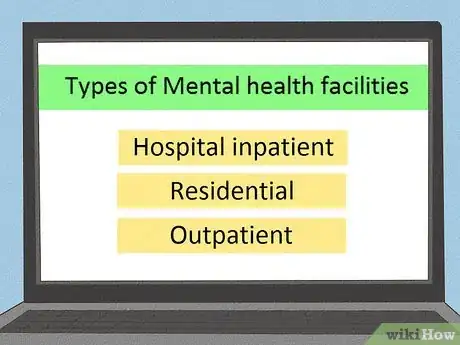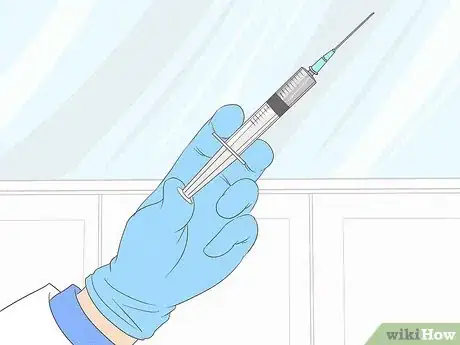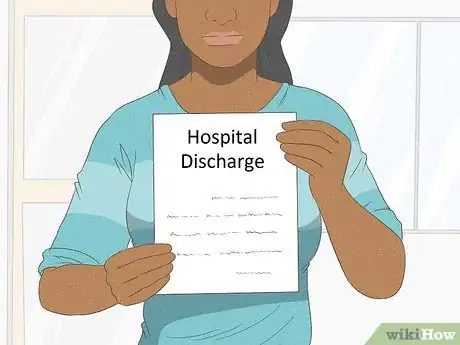wikiHow is a “wiki,” similar to Wikipedia, which means that many of our articles are co-written by multiple authors. To create this article, 10 people, some anonymous, worked to edit and improve it over time.
This article has been viewed 33,933 times.
Learn more...
In TV, movies and books, psychiatric wards (more often referred to as mental hospitals) are depicted as places with the padded rooms, patients who hallucinate and claw at the walls, and has an overall dark tone to it. As a result, it can be frightening to have to go into a mental hospital—especially as an adolescent. However, these types of hospitals aren't nearly as bad as they're portrayed in the media, and there are ways to cope with being in a teen psychiatric ward.
Steps
Before Being Admitted
-
1Understand what psychiatric wards are. Mental hospitals aren't chock-full of people banging on the walls screaming at the voices in their heads—the people there are all there for many different reasons. Some people go for suicidal thinking or suicide attempts, some go because of things such as eating disorders, some go due to their mental disorders causing problems in their life, and some simply go for changes to their medication. Many of them are good people.
-
2Know the type of facility it is. Some mental hospitals are dedicated solely to one thing—eating disorders, for example. Other types, sometimes referred to as residentials, are meant for stays that are a month or longer. Regardless of the type of facility, the adolescent unit and the adult unit should not be mixed.Advertisement
-
3Think about why you need to go. Psychiatric hospitals typically only take patients who are at risk of causing harm to themselves or others, so figure out the reason you're going. Regardless of the reason, don't be ashamed. Mental illness isn't your fault, and going to the hospital doesn't mean you're weak—it means you're strong enough to get help.
-
4If possible, research the facility you're going to. If you know the name of the facility you're going to be staying at, do some research on it before going. Even if you can't change which one you're going to, knowing the general quality of the facility can be a motivator in getting out faster.
-
5Know that you aren't "crazy" or "weak". Due to the stigma of mental illness, psychiatric wards have a reputation for being filled with "crazy" people, and there's a common stigma associated with going to one. However, know that you're not "crazy" or "weak" for having to go to a psychiatric ward. Having a mental illness isn't your fault. By going to the hospital, you're accepting that your mental illness—whether it's depression, schizophrenia, or anything else—is too much for you to handle safely, and you're asking for help.
Going to the Hospital
-
1Prepare to be searched. In a psychiatric ward, you will be evaluated to see if you are at risk of harming yourself or others, and kept in the ward if you meet that criteria. You may be asked to remove your clothing, and depending on the ward, will either be allowed to keep your clothing or will get clothing from the ward.
- Things that will be confiscated, regardless of location, include:
- Anything sharp (whether it's razors or pencils)
- Anything with wires in it, such as underwire bras or cables
- Things with drawstrings, laces, or anything rope-like (for example, shoelaces or scarves)
- Alcohol or drugs, including cigarettes (required medications will be kept by the front desk)
- Personal belongings, such as wallets or cell phones
- Earrings and any other jewelry that is deemed as a risk
- Things that may be confiscated depending on your location include:
- Clothing
- Jewelry such as bracelets
- Stuffed animals
- Other things deemed as a risk—don't be afraid to ask why!
- Things that will be confiscated, regardless of location, include:
-
2Know the admission process. In a psychiatric ward, you'll be asked questions about yourself, especially if this is your first stay. The questions are typically limited to your physical health and if you've been diagnosed with any mental health problems. Be honest when answering these questions, as lying about it can cause a lot of problems later on.
- You're likely to need to have blood taken at some point - possibly immediately if you didn't have it taken at the emergency room. If you're afraid of needles, let them know; they can support you and give anti-anxiety medication if needed. The nurses may wake you up during the night to try and get blood samples. You'll also be required to give a urine sample.
-
3Explore the hospital. Depending on when you arrive at the hospital, you may be allowed to learn the way around the hospital, or you may have to go straight to bed. Make sure you know your room number and where the patients gather during the day, and be aware of the rules regarding rooms in the ward.
- Depending on the ward, you may have to stay in the common room all day and aren't allowed in your room until bedtime. Other wards will allow you to stay in your room, but nurses will check on you periodically. Don't argue these rules unless you have a legitimate reason—the nurses won't let you stay in your room all day if you just don't feel like getting up.
-
4Know the room quarters. Depending on the hospital, you may or may not have roommates. The number and age of the roommates will vary, but try talking to them a bit. Even if you're not allowed to talk about why you're there, having someone to chat with about the hospital can be a huge relief.
- Roommates will be of your same sex. People who are transgender or non-binary will likely get rooms alone or with people who have the same assigned sex.
- Typically, people who are not in your room are not allowed in your room, especially if they're of a different sex. Violation of this rule can lead to consequences decided on by the nurses in charge of the ward.
-
5Know the schedule for the day. Usually, psychiatric wards have a set schedule for the week, including mealtimes, group sessions, school, visiting hours, and phone hours. Medication times and bedtimes vary among facilities, but the bedtime in adolescent units typically will be between 8 and 9 PM.
-
6Be aware of what's considered misbehavior. Psychiatric wards will have certain rules that need to be followed, and patients who don't follow these rules may be placed on line-of-sight (meaning that a nurse has to be watching them at all times) or take a medication to knock them out. If you feel you have been wrongly labeled as misbehaving, explain as calmly and patiently as you can, and know that if the nurses made the decision, they likely made it for a reason—even if it doesn't seem fair.
- If a patient is being extremely aggressive or is trying to flee the hospital, they'll be administered a drug through a shot in the bottom. This is sometimes referred to as "booty juice". If you come to the point of needing to be knocked out, take the medication voluntarily; when getting the shot, you're restrained to a bed, and many patients are in pain for the following days.
During Your Stay
-
1Know the daily routine. Normally, patients wake up, get their vitals (blood pressure, weight and temperature) checked, get their medication, and go to eat breakfast. Then you're likely to have groups or school. However, the schedule is different for every hospital. Ask about the schedule or find it in the common room.
-
2Follow the schedule. If you're having a rough day and stay in your room without eating or participating in groups, you're likely to stay longer than you want to. On the flip side, if you cooperate with groups and do your best to follow schedules, including showering when shower times are available, you're likely to be discharged faster.
-
3Know about medications. If your parents consent, the psychiatrist at the hospital will try to start you on medication for your mental health. Make sure to ask about the medicine if you haven't already, as hospitals may assign you the wrong one to start off with. If you're already on medications, whether they're related to mental or physical health, they will be kept at the medicine counter and given to you when you need them.
- If a medication that you have been placed on is giving you debilitating side effects or is making you feel worse, tell your psychiatrist as soon as possible. They can adjust your dosage or take you off the medication and try a new one.
-
4If allowed, talk to patients. Some wards are extremely strict and don't allow you to talk to patients or tell them why you're at the ward. However, some do, so take advantage of talking to the patients. Make friends at the ward and learn stories of the ward. Many patients have been in hospitals multiple times, and they may share their opinion on certain hospitals and the nurses there. If possible, exchange phone numbers when you or the other person is getting discharged. You may have made a good friend.
- Some of the other teens will mostly keep to themselves. You can try to talk to them, but you may get varying results.
- Almost every psychiatric ward has rules against patients touching each other, so you won't be able to hug other patients while you're there. At some hospitals, though, the nurses may look the other way if someone is leaving and you want to hug them goodbye.
- Psychiatric wards strictly forbid romantic relationships between patients. If you're caught cuddling up with, holding hands with, or kissing another teen in the ward, the nurses will likely put both of you on watch to prevent you two from getting close.
Getting Discharged
-
1
-
2Retrieve your belongings. Make sure your parents get your belongings from the front desk, and you take your clothing and other items from your room. Try to leave your room - or your section of it - clean, and check everywhere in your room for your things.
- It's recommended to strip your bed while doing this. It makes less work for the nurses, and is sometimes required by them.
-
3Know the recommendations for after leaving the hospital. After leaving the hospital, you may have to keep seeing a psychiatrist and start or continue therapy sessions. Make sure to find good fits for psychiatrists and therapists, as otherwise the sessions won't be beneficial.
-
4Be prepared to talk with your parents or guardian. After being hospitalized, there can be many questions from your caretakers, such as "why did you do it" or more offensive questions. These can be quite heated conversations, so make sure that they understand that you're still sensitive and need to refrain from yelling.
-
5Keep an eye on your warning signs. Unfortunately, some teens have to go to a psychiatric ward more than once. If you're one of those teens, keep an eye on your behavior and your thought processes; while you can't control your mental illness, you can do a lot to halt unhealthy thought processes, and failing that, you can recognize that you're getting to a bad place and alert a parent, guardian, or therapist.
- You might feel ashamed of telling your parents or guardian that you're struggling. However, the vast majority of parents or guardians want their teen to be healthy and happy. If you tell them you're having suicidal thoughts, for example, they'd be more focused on making sure you're safe than on judging you.
- Keep in mind - just because you're in a bad place doesn't mean that you have to go to the hospital again. It's possible to develop "safety plans", where you and your parents (and sometimes, your therapist) agree to do certain things to keep you at home and safe. You may agree to sleep in your parents' room, and your parents may agree to remove all potentially hazardous things from areas easily accessible to you.

























-Step-13.webp)





















































Medical Disclaimer
The content of this article is not intended to be a substitute for professional medical advice, examination, diagnosis, or treatment. You should always contact your doctor or other qualified healthcare professional before starting, changing, or stopping any kind of health treatment.
Read More...